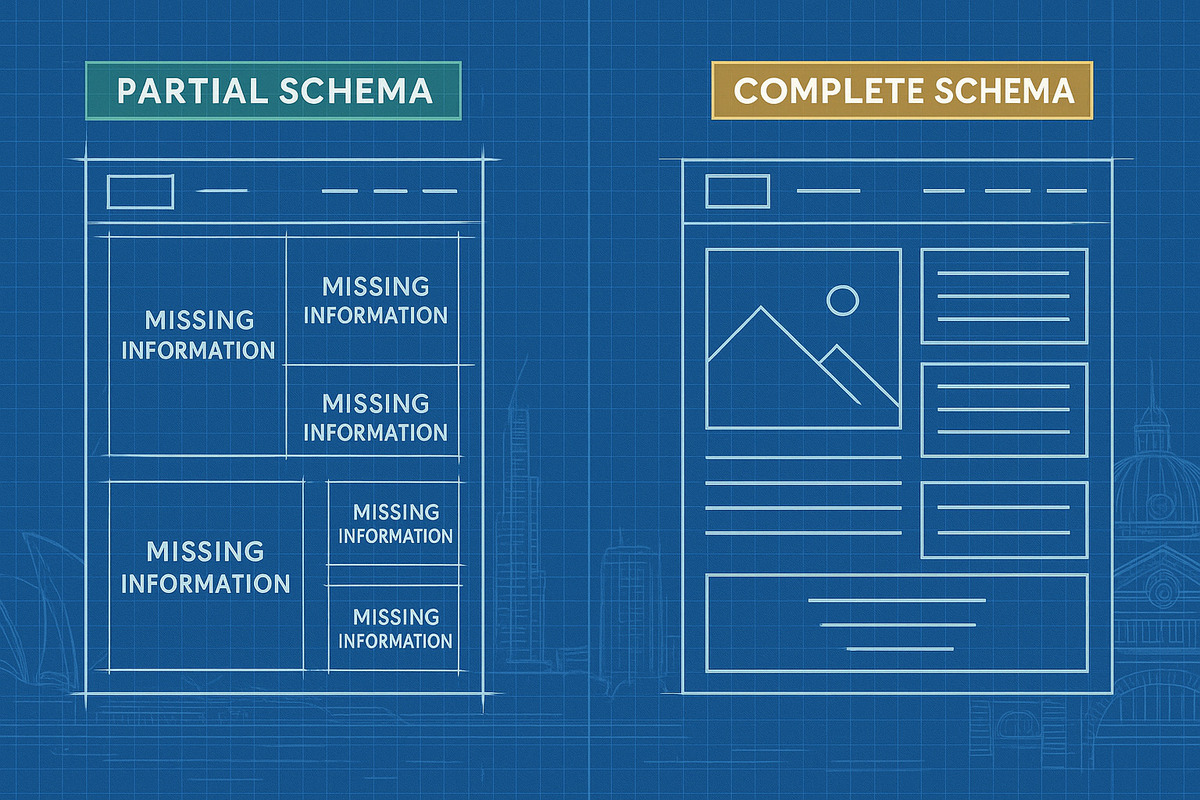Summary: Structured data implementation is foundational for local SEO across the European Union, influencing visibility in traditional search, voice search, and AI-driven results. This analysis examines the necessity of complete JSON-LD schema markup. We argue that attempting to cherry-pick schema or relying on the minimum required properties sends confusing signals to search engines, damages entity understanding, and reduces ranking potential in markets like Amsterdam, Paris, and Frankfurt. A complete schema implementation is mandatory for effective local digital marketing.
Minimum Required Schema for SEO Fails Local Businesses in the EU
Is your website speaking a language search engines fully understand? If you are deploying partial JSON-LD schema, the answer is likely no. Many businesses across Europe implement the bare minimum structured data required to clear validation tools, believing this is sufficient. This approach to schema implementation is fundamentally flawed for local SEO, especially in a multilingual environment.
Structured data is the vocabulary used to describe your content and business entities to machines. In the diverse and competitive markets of the EU—from Stockholm to Madrid, London to Milan—clarity is required. To be effective, a schema markup strategy must be thorough and localized. Relying on incomplete data risks more than just missing out on rich snippets; it risks confusing Google about your local relevance and offerings.
The Precision Required in Structured Data Implementation
Schema markup, specifically LocalBusiness schema, translates your business details into structured data. This data feeds algorithms, including Google’s local pack algorithms and Knowledge Graph, and informs Large Language Models (LLMs). The process is about entity SEO—defining who you are, where you are, and what you do.
When considering complete vs. partial schema, understand that search engines desire maximum information. They use this information to match local user intent with the most relevant and trustworthy results. If you provide a LocalBusiness schema for a location in Paris, search engines want to know more than just the name and address. They want operating hours, social profiles, precise service areas (arrondissements), price ranges in Euros, multi-lingual contact details (knowsLanguage), and local identifiers.
A complete schema implementation provides this depth. It leaves no ambiguity. The benefits of complete schema markup include better contextual understanding by search engines, leading to improved local relevance scoring across different regions and languages.
Mixed Signals: The Impact of Incomplete Structured Data
Incomplete schemas generate confusion in local search. Imagine providing a Restaurant schema in Milan without a menu link or servesCuisine type. The search engine sees a food establishment but cannot determine its relevance to a user searching for “Pizza near me.” This ambiguity forces the algorithms to make assumptions.
If you cherry-pick schema properties, you create an inconsistent narrative. For example, if your LocalBusiness schema lacks precise geoCoordinates or detailed openingHoursSpecification, search engines may struggle to verify your physical location and availability. This is a common schema implementation mistake. Furthermore, inconsistencies between your schema data and your Google Business Profile (GBP) data create further confusion.
The impact of incomplete structured data is a weakened local entity definition. Search engines prioritize clear, verifiable information. Mixed signals resulting from partial implementation often lead to your business being superseded by competitors who provide a fuller picture. Schema validation may show green lights for required properties, but recommended properties are essential for local optimization.
The Risks to SEO, AEO, and GEO/LLM Optimization
The consequences of partial schema extend across the entire search ecosystem. It significantly affects traditional Search Engine Optimization (SEO), Answer Engine Optimization (AEO), Geographic Optimization (GEO), and Large Language Model Optimization (LLMO).
Local SEO and Rich Snippets
Does schema affect Google rankings? In local search, absolutely. Complete schema is necessary for eligibility for many local rich snippets and detailed information presented in the GBP knowledge panel. These enhanced results increase click-through rates and foot traffic. Partial schema rarely delivers impactful local features.
AEO and Voice Search
Voice search is inherently local and varied in language across the EU. Answer engines and assistants rely heavily on structured data to provide direct answers. If a user in Amsterdam asks, “What time does [Your Business] close today?” in Dutch, a complete, localized LocalBusiness schema provides that information instantly. Incomplete schema means the assistant cannot answer.
GEO (Geographic Optimization)
For businesses targeting specific EU cities like Frankfurt or Madrid, precise geographic data within the schema is essential. Properties like serviceArea and accurate addressLocality, addressRegion, and addressCountry help search engines understand your exact local relevance. Omitting these details severely weakens your geographic search signals.
LLMO (Large Language Model Optimization)
AI models are trained on vast datasets. When LLMs ingest your website’s information, complete schema provides accurate, organized facts about your local operations. This increases the likelihood that AI-driven search experiences and chatbots will recommend your business. Incomplete schema can lead to AI providing incorrect location or service details, or failing to understand your business’s compliance with local regulations. Incomplete schemas can hurt your Search and LLM Ranking.
Why Cherry-Picking Schema Fails Local Strategy
Attempting to cherry-pick schema—selecting only the easiest properties to implement—is like firing a gun with your eyes closed. You might hit something, but you are unlikely to hit the target. This approach fails to capitalize on the specific advantages structured data offers local businesses.
Search algorithms are designed to identify patterns and relationships. When data is sparse, local relationships cannot be established. A schema markup strategy requires defining the local business entity and then describing it fully, nesting related services or products within the main structure.
For instance, a Service schema should not just have a name. It needs serviceType, areaServed, provider (linked back to the LocalBusiness), and description. Is partial schema markup effective? Not for local visibility.
When you decide to use multiple schema types on one page (e.g., LocalBusiness and Event), they must be interconnected and complete to form a coherent graph. Disjointed, partial schemas create noise, not local signal.
Addressing Implementation Challenges
A common objection to thorough schema implementation is the perceived difficulty, particularly when managing multiple locations across the EU. Small business owners often state, “We cannot always get all the specific information easily. This is going to add time to the project and extra administration.”
Gathering detailed information—like precise geo-coordinates, departmental phone numbers, local business registration numbers, and localized descriptions—does require effort. This administrative overhead is a real concern for SMB owners in busy markets like London or Stockholm.
The rebuttal is straightforward: If you do it right from the start, you never have to worry about it again. The time invested in building a complete local schema template pays dividends indefinitely through better local rankings. It is a foundational element of technical SEO.
Incomplete work will eventually need correction, often requiring more time later when local competitors capture the market share. Viewing this process as an investment in local visibility across multiple countries is necessary.
How to Prioritize Schema Implementation for Local Effect
Developing a sound schema markup strategy involves prioritizing the LocalBusiness schema and ensuring its complete implementation.
- Define Your Local Entity: Select the most specific
LocalBusinesssubtype (e.g.,Dentist,Store,Restaurant). - Maximize
LocalBusinessProperties: Fulfill all relevant properties. Essential items include:Name,Address(accurate and matching GBP),Phone(local number).geoCoordinates(latitude and longitude).openingHoursSpecification.urlandsameAs(social profiles and local directories).imageandlogo.priceRangeandcurrenciesAccepted(EUR, GBP, SEK, etc.).department(if applicable).knowsLanguage(essential for EU markets).
- Nest Offerings: Implement
ProductorServiceschemas and link them to theLocalBusinessusing theproviderormanufacturerproperties. - Validate and Monitor: Use Google Search Console and tools for testing schema markup (like the Schema Markup Validator). Monitor the Enhancements reports for errors.
The minimum required schema for SEO is merely the entry point. For businesses aiming to dominate local search results across the EU, maximizing the potential of structured data is required.
The Mandate for Complete Information
The debate between complete vs. partial schema implementation is settled by the requirements of local search algorithms. Search engines and LLMs demand clarity, detail, and verifiable local information. Providing anything less compromises your local digital strategy.
Incomplete schema damages your ability to rank locally, reduces your eligibility for enhanced search features, and muddles the understanding of your business entity. A thorough schema markup strategy is not optional; it is a prerequisite for sustainable local SEO success in the European Union. Do not cherry-pick your data; provide the complete picture.


